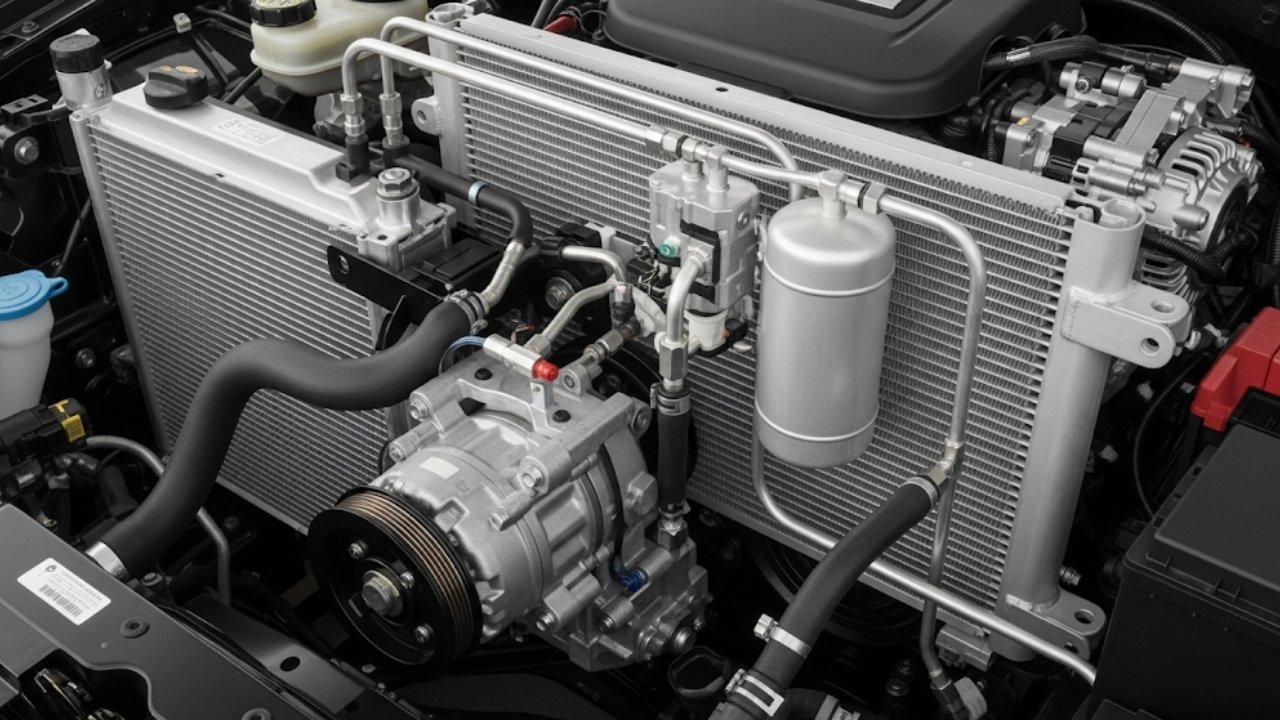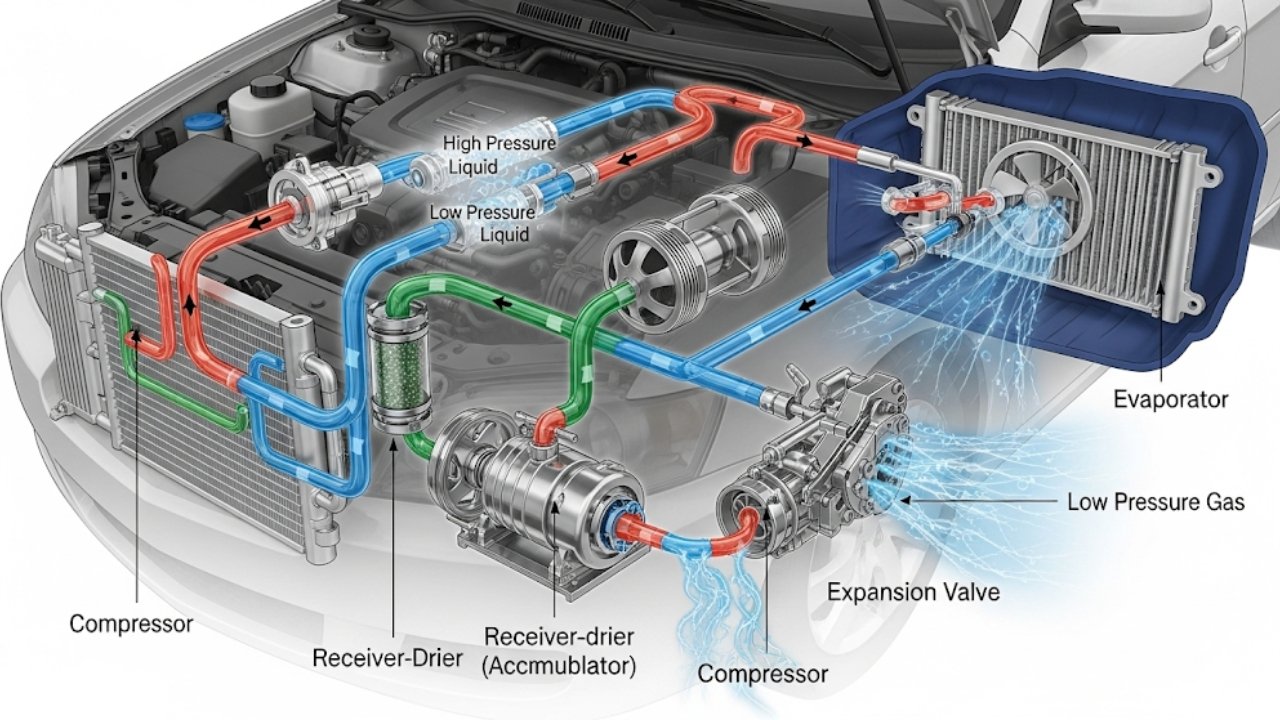Car Air Conditioning Cost

Imagine this: you’re stuck in traffic on a blazing summer day. Sweat drips down your temple, and all you want is a blast of cold air. You crank up your car’s AC… and nothing but lukewarm disappointment hits your face. We’ve all been there. That moment often leads to one haunting question—“What’s the car air conditioning cost to fix this?”
This article dives deep into car air conditioning cost, not just from a numbers standpoint but from real-world experience, mechanical insight, and a touch of empathy. Whether you’re dealing with a minor refrigerant recharge or a full-blown compressor replacement, we’ll walk you through the ins, outs, and expenses of keeping your cool on the road.
How Does Car Air Conditioning Work? (Simple Breakdown)

Here’s the quick breakdown of how each part works:
-
Compressor: Think of this as the heart of your AC. It compresses low-pressure gas into a high-pressure, high-temperature gas. It’s belt-driven by your engine.
-
Condenser: Located at the front of your vehicle, it uses airflow to cool down that gas into a liquid.
-
Dryer: Contains a moisture-absorbing material (desiccant) that removes water from the refrigerant.
-
Expansion Valve (or Orifice Tube): This little piece allows the pressurized liquid to release into a fine mist and rapidly cool down.
-
Evaporator: Hidden behind your dashboard, this is where the magic happens. The cold refrigerant absorbs heat from the cabin air, turning back into a gas.
Fun Fact: Your car AC system doesn’t create cold—it removes heat!
What Are the Signs of a Failing Car AC?
Your car’s AC doesn’t just fail silently. It drops hints like a passive-aggressive roommate. Here are the most common red flags:
1. Warm Air Instead of Cold
This one’s obvious but annoying. You turn on the AC, but the air isn’t cold. This could mean:
-
Low refrigerant levels
-
A leaking system
-
Compressor failure
-
Clogged condenser
2. Weird Noises
If your AC makes a clunk, thud, or rattle, it might be the compressor clutch or the compressor itself trying to die dramatically.
3. Foul Smell
Musty, moldy odors? That could mean mold in the evaporator or a failing dryer that isn’t removing moisture properly.
4. AC Turns On, But No Air Comes Out
Often an electrical fault—blown fuse, bad blower motor, or frayed wires.
5. Short Cycling
The AC turns on and off frequently. Could be due to refrigerant pressure issues or sensor malfunctions.
Pro Tip: If your AC starts acting up, don’t wait. Early detection = cheaper repair.
How Much Does It Cost to Repair a Car’s AC?
This is where things get real. Let’s talk dollars. A standard AC service (including inspection and refrigerant recharge) typically costs between $430 and $521 depending on your vehicle and where you live.
Here’s a table showing real-world average costs for common vehicles:
| Vehicle | Average Parts Cost | Average Labor Cost | Average Total Car Air Conditioning Cost |
|---|---|---|---|
| 2017 Honda Civic | $106 | $324 | $430 |
| 2017 Ford F-150 | $198 | $323 | $521 |
| 2019 BMW 740i | $67 | $373 | $440 |
Key Insight: Labor costs make up over 75% of the total car air conditioning cost in many cases.
When Repairs Aren’t Enough: Cost of Replacing AC Components
Sometimes, a quick fix or recharge won’t cut it. You might need to replace major components—especially the compressor, which is often the most expensive part to fail.
Here’s what the car air conditioning cost looks like for compressor replacement:
| Vehicle | Parts Cost | Labor Cost | Total Replacement Cost |
|---|---|---|---|
| 2017 Honda Civic | $908 | $849 | $1,757 |
| 2017 Ford F-150 | $610 | $709 | $1,319 |
| 2019 BMW 740i | $1,860 | $655 | $2,515 |
Ouch, right? The compressor alone can burn a hole in your wallet. That’s why many drivers dread hearing, “It’s the compressor.”
Mechanic Insight: A bad compressor can be caused by lack of refrigerant, which also means lack of lubrication. It’s like running your engine without oil—it won’t end well.
What Factors Affect Car Air Conditioning Cost?
Not all repair bills are created equal. Several things influence the final cost:
-
Vehicle Make and Model: Luxury cars (BMW, Mercedes) generally cost more to repair.
-
Type of Repair Needed: Minor recharge vs full compressor replacement makes a huge difference.
-
Parts Availability: Hard-to-find components mean higher prices.
-
Labor Rates: Vary depending on region. Urban areas = higher labor costs.
-
Age of Vehicle: Older cars may need more extensive diagnostics and part replacements.
Quick Tip: Always ask for a detailed estimate. Don’t accept a vague “It’ll be around $1,000.”
Can Extended Warranties or Insurance Cover the Cost?
Yes—and it could save you big time.
If your car is still under the manufacturer’s bumper-to-bumper warranty, you may be covered for AC repairs, especially if the failure is due to a manufacturing defect.
But if your car is out of warranty, you’re on your own—unless you bought an extended warranty.
Real-Life Example:
Michelle from Florida had a $1,400 AC repair but only paid $100 thanks to her extended warranty. That’s a win!
Pro Insight: A single AC repair can make your warranty worth it. Even if you don’t break even, the peace of mind alone may be worth the cost.
How to Lower Car Air Conditioning Cost (Smart Owner Tips)
We all want to stay cool without melting our wallets. The good news? You can reduce your chances of a costly AC repair by being a smart, proactive car owner.
Here’s how:
Regular Maintenance Is Key
-
Run your AC once a week, even in winter. It keeps the compressor and seals lubricated.
-
Change your cabin air filter every 12,000 to 15,000 miles. A clogged filter strains your blower motor.
-
Keep your vents clean to prevent debris from damaging the evaporator or condenser.
-
Check for unusual noises or weak airflow. Don’t wait—small issues get worse fast.
Recharge Refrigerant On Time
A refrigerant recharge costs less than $150 in many areas. If your car’s blowing slightly less cold, a recharge might be all you need—don’t wait for total failure.
Protect Your AC from External Damage
-
Park in the shade when possible.
-
Wash your car’s front grille often—road gunk clogs the condenser.
-
Avoid slamming the A/C from off to full blast repeatedly.
Use It Right
Running your AC on full blast 24/7 will wear it out faster. Use the recirculate mode to maintain cabin temperature with less strain on the system.
DIY vs Mechanic: Can You Fix Car AC Yourself?
Let’s be honest—fixing your own AC sounds cool (pun intended), but is it realistic?
What You Can Do Yourself:
-
Replace cabin air filters
-
Clean AC vents and dashboard ducts
-
Recharge refrigerant (with a DIY AC recharge kit)
What You Shouldn’t Try Without Experience:
-
Replacing the compressor or evaporator
-
Diagnosing electrical faults
-
Fixing leaks in the system
Warning: The AC system operates under high pressure. A misstep could cause injury—or worse, damage your car further.
Tip: If your system still doesn’t blow cold after a recharge, don’t guess. Get it diagnosed by a professional.
FAQs: Common Questions About Car Air Conditioning Cost
How often should I service my car’s AC?
Every 1–2 years, or as recommended by your vehicle manual. Regular service can catch leaks or wear before major damage occurs.
Why is the car air conditioning cost so high?
Because of labor and part complexity. Components like compressors are expensive, and many parts are tucked deep behind the dashboard, increasing labor time.
Is it okay to drive with a broken AC?
Mechanically? Yes. Comfort-wise? Not really—especially in summer. However, if the compressor clutch is broken or seizing, continuing to drive could damage your engine belt system.
How long do car AC systems usually last?
With proper maintenance, most systems last 8–10 years before major repairs. Refrigerant recharges may be needed every few years.
What’s the cheapest way to fix a warm-blowing AC?
Start with a refrigerant recharge. If that doesn’t solve it, have the system inspected—don’t replace parts without proper diagnosis.
Can a refrigerant leak be fixed?
Yes, but only if it’s small. Sealing leaks or replacing o-rings may cost under $300. Larger leaks could require replacing hoses, valves, or the condenser.
How can I tell if I need a new compressor?
-
You hear loud clicking or clunking when turning the AC on.
-
The air isn’t cold, and recharging didn’t help.
-
The compressor clutch won’t engage.
Can weather affect my car’s AC performance?
Yes! In extremely hot weather, AC systems work harder. Also, humid climates can overwork the evaporator or dryer if not well-maintained.
Real Talk: Is the Cost Worth It?
Let’s wrap this up with a little honesty. Replacing or repairing your AC isn’t cheap. But when you’re stuck in sweltering heat or trying to survive a long road trip, that cool breeze from your vents feels like a gift from the gods.
Think of car air conditioning cost as part of your overall vehicle comfort budget—just like tires, oil changes, and brakes.
Some people tough it out, crack a window, and save a few bucks. Others (like me!) value comfort, focus, and being sweat-free during meetings, dates, or family drives.
The choice is yours—but knowledge is power.
Final Thoughts: Keep Your Cool Without Breaking the Bank
Whether your AC is blowing hot air, making weird noises, or just not working at all, understanding the car air conditioning cost gives you the power to make smart choices.
Here’s what to remember:
-
Don’t ignore early warning signs
-
Stay on top of regular AC service
-
Know what’s DIY-friendly and what’s not
-
Budget for repairs before they surprise you
-
Consider an extended warranty if you drive often or own a luxury vehicle
Your car’s AC system is more than a luxury—it’s a comfort essential. Give it the care it deserves, and it’ll return the favor by keeping you cool when it matters most.



